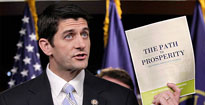Is Ryan's Budget a Suicide Pact?
 Jonathan Chait writes:
Jonathan Chait writes:
One of my favorite descriptions of the modern Republican party came during the late 1990s, when the Republican revolution had blundered into one of its periodic acts of self-immolation. An anonymous Clinton administration official gloated to the Washington Post, “Every once in a while the Hezbollah wing of their party gets ahold of the steering wheel and drives right off the cliff.”
Another one of those “every once in a while” moments is happening again now as the party has put before the voters their plan to radically rewrite the social compact. The Paul Ryan budget received its first test run in a special election in aconservative upstate New York district, whose Republican share of the vote has veered between 52 percent in the worst years to nearly 74 percent in the best years. With the Ryan plan serving as the central issue of the campaign, the Democrats won a shocking upset.
The Republicans’ response? Hit the gas. There’s nothing but blue sky ahead!
Now, with all but four members of the House having already stuck their neck out and voted for a budget that combines the unpopular policy of reducing taxes for the affluent with the even more unpopular policy of slashing social insurance benefits, there’s not much Republicans could do to help the lower chamber. Yet, astonishingly, Republicans have doubled down. Gleeful Democrats called the budget for a vote in the Senate. Given a chance to cast a free vote distancing themselves from the plan, 40 of 45 GOP senators voted yes anyway. Presidential candidates like Tim Pawlenty, who does not even have to vote on the issue, announced that he would sign the budget. Evidence of the public’s rejection of Ryan has only made the faithful more fervent to display their fealty to him. Dick Cheney announced, “I worship the ground Paul Ryan walks on.”
His fellow partisans are retreating into a fantasy world in which the only barrier to public acceptance is a failure to make their point clearly enough. Politico reports that Senate Republicans believe they must “make the case that their proposals would ‘save’ Medicare — while Democrats are content with leaving the program on the brink of collapse.” That sounds like a brilliant idea, except Republicans in upstate New York repeatedly used that line against Kathy Hochul. (Sample campaign talking point: “Kathy Hochul may try to cover up her plan to let Medicare run out of money and trigger massive slashes to benefits for New York seniors who depend on the program.”)
Anti-tax jihadist Grover Norquist declared that the solution is to distribute 150,000 copies of a video of Ryan defending his plan to faithful believers. “The challenge will be to teach each of our activists to deliver the Ryan speech.” Perhaps young Republicans can drop out of college for a couple of years to knock on doors, clutching copies of Atlas Shrugged and spreading the Good News.
Meanwhile, Karl Rove, who now advises the pro-Republican ad-bombing group American Crossroads, also insists the public will see things his way. He argues that his group has developed a secret, killer argument for the Ryan budget. “55 percent in the Crossroads survey agreed with GOP arguments for the Ryan reforms,” he boasts, “while just 36 percent agreed with the Democrats' arguments against it.”
It’s not clear why American Crossroads decided to leave this devastatingly effective argument in its holster even as it unleashed a tidal wave of spending in a futile effort to save Hochul’s opponent. But it’s helpful to understand just what Rove is saying here. People tend to have ill-defined views on most issues, and even slight changes in wording can produce dramatically different answers. Advocacy groups for every cause under the sun like to commission polls that show that the public agrees with them, and it can almost always be done if the wording is just right. If that somehow fails, the pollster-for-hire can present the respondents with arguments that are designed to push them toward the desired result.
This trick can gin up the appearance of public support. But it’s not an actual tool for measuring public opinion, because in real life political debates, you can’t control the arguments your opponent decides to make. New York Times blogger Nate Silver recently joked, “Our plan to cut deficit by selling nukes to Afghan warlords will be VERY popular once voters get to hear both sides of the argument.” And, of course, if you worded it just right – Would you approve of a plan to simultaneously reduce the deficit and arm anti-communist freedom fighters who have strong religious values? – you could probably get a result like that.

